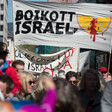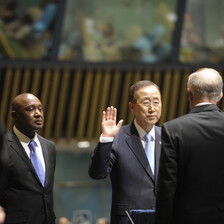The Electronic Intifada 4 December 2015

G4S has been protested by Palestine solidarity campaigners worldwide.
ActiveStillsThe Jordanian branch of the UN Refugee Agency is no longer using the services of the British security firm G4S.
The firm has long been targeted by the boycott, divestment and sanctions movement for its involvement in human rights abuses against Palestinians. It provides services to Israeli prisons and checkpoints in the occupied West Bank, where Palestinians are frequently tortured and mistreated.
The decision by the Jordanian branch of the UNHCR, as the refugee agency is known, follows protests in five major cities worldwide last weekend. Activists marked the International Day of Solidarity with the Palestinian People by denouncing the UN’s relationship with G4S.
According to the Palestinian BDS National Committee, the UN has contracts with G4S worth more than $22 million annually.
G4S is complicit in the detention without trial and torture of Palestinian political prisoners, including children. Some 1,800 Palestinians, including 300 children, have been arrested since the beginning of October, the Palestinian prisoner rights group Addameer says.
In recent years, several major institutions have either stopped contracts with or divested funds from the company. These have included the Bill and Melinda Gates Foundation and Columbia University in New York.
BDS activists hailed the latest decision to sever ties with G4S.
“We welcome the announcement of UNHCR in Jordan that it is no longer hiring G4S,” said Yazeed Halaseh, a member of the Jordan BDS group. “G4S is at the heart of Israel’s use of mass incarceration to repress Palestinian opposition to its military occupation and settler colonialism.”
Breaking international law
Despite the move by UNHCR, a number of other UN agencies continue to hold contracts with G4S. These include the children’s fund UNICEF and the United Nations Development Program.
In September, more than 200 Palestinian and international organizations signed a letter to UN Secretary-General Ban Ki-moon declaring that G4S violates the UN’s code of conduct for procurement.
“By maintaining security systems at Israel’s prisons, G4S assists Israel with its use of mass incarceration to deter Palestinians from protesting against Israel’s violations of international law,” the letter states.
“Through its involvement in prisons inside Israel, G4S is complicit in Israel’s violations of Article 76 of the Fourth Geneva Convention, which prohibits the transfer of prisoners from occupied territory into the territory of the occupier,” the groups add.
The same letter points out that G4S’s links to abuse are not limited to Palestine. The company faces allegations of labor rights violations in Malawi, Mozambique, South Africa, Uganda, South Korea as well as being linked to prisoner deaths in the UK and elsewhere.
The UN code of conduct on suppliers states that “the UN expects its suppliers to support and respect the protection of internationally proclaimed human rights and to ensure that they are not complicit in human rights abuses.”
In 2012, Richard Falk, then a UN special rapporteur on Palestine, issued a report approved by the UN General Assembly that named G4S among international businesses that profit from Israeli settlements in the West Bank.
Falk recommended that G4S and a number of other companies should be boycotted until they brought their “operations into line with international human rights and humanitarian law and standards.”
Skeptical
Falk named G4S among those claiming the desire to end operations that violated the UN Global Compact, a policy initiative for businesses committed to operating in accordance with human rights principles.
In June, it was reported that the UK’s National Contact Point, a government-funded watchdog, “cleared” G4S of direct involvement in human rights abuses.
However, the agency stated there were “adverse human rights impacts” at G4S facilities and locations referred to in the complaint.”
That complaint was filed by Lawyers for Palestinian Human Rights. The Financial Times quoted that organization’s director, Tareq Shrourou, as welcoming the agency’s decision as “a starting point for addressing G4S’s involvement in Israel’s serious human rights violations against Palestinians.”
While refusing to admit any wrongdoing, G4S announced last year that it would not renew contracts for prison operations in the West Bank as well as within present-day Israel when those contracts expire in 2017. G4S also claimed that it will end other aspects of its activities in Israeli settlements in the West Bank, all of which are all illegal under international law.
Despite that apparent victory, activists remain skeptical and vigilant.
In a statement to The Electronic Intifada at the time, Addameer’s advocacy officer Randa Wahbe said that “G4S has a long track record of saying one thing but doing another and has not made any formal written statements about when it intends to end its contracts with the Israel Prison Service and other aspects of Israel’s apartheid regime. The campaign against G4S will continue until it actually ends all contracts that support Israel’s military occupation.”
In the meantime, activists will continue to apply pressure to institutions that still hire or invest in G4S.
Ryan Rodrick Beiler is a freelance photojournalist and member of the ActiveStills collective who lives in Oslo, Norway.





